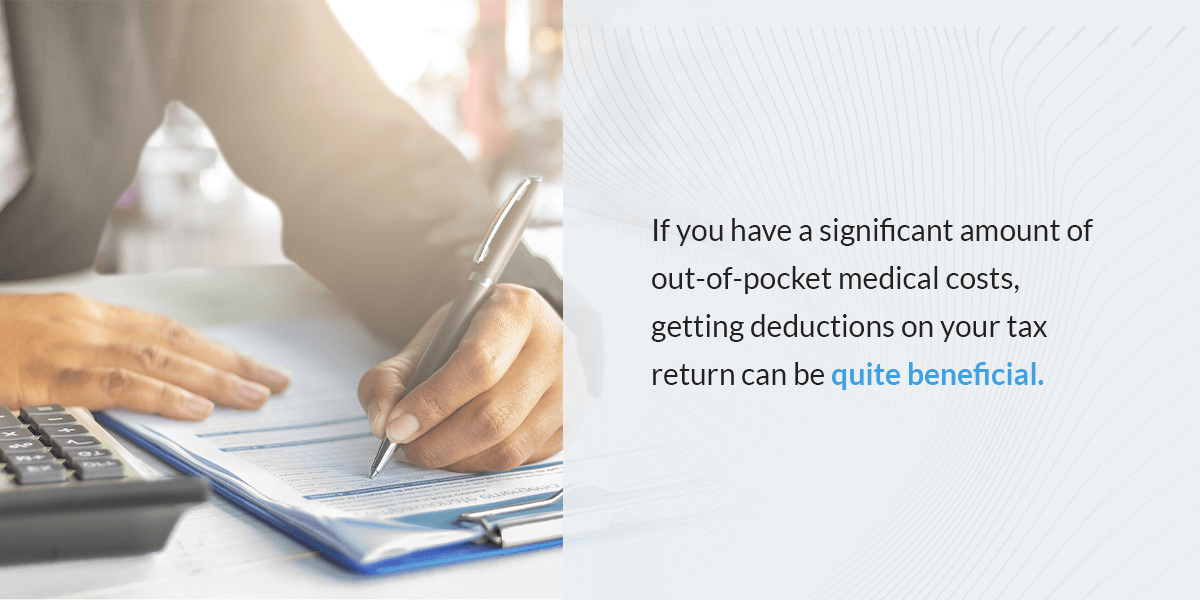
One nice offset of paying hundreds of dollars a year to your doctor and to the hospital is the fact that you can use those expenses as a deduction on your tax return. If you are thinking about deducting your medical expenses, it’s important to know that your bills must add up to more than 7.5% of your tax year’s adjusted gross income (AGI). If your bills fall under that threshold, then you cannot deduct them from your tax return. If they are above the threshold, here are some things to keep in mind when deducting it!
The medical expenses you can deduct include a wide range of treatments and services for yourself, your spouse and any dependents you claim. If you’re new to medical deductions, you may be wondering, “What are qualified medical expenses?” While it’s far from being extensive, this list will help give you an idea of what types of medical bills you can deduct from your taxes.
“Medical expenses” is pretty broad, but for good reason. The complete list has included 25 pages of qualified deductions in the past, and it’s updated every year, so be sure to consult updated versions if you can’t find what you’re looking for. There are a lot of medical items you can deduct from your tax return. Here are some common examples:
If you have a significant amount of out-of-pocket medical costs, getting deductions on your tax return can be quite beneficial and is worth looking in to.

Along with deducting your medical expenses, you can also deduct expenses that come from dental or vision care. You can potentially deduct items like dental visits, braces, implants, root canals and other dental procedures. You also could deduct eye exams, contacts and glasses if you need to. If you aren’t sure if a dental or vision expense counts, keep the receipt and record of the procedure or item and ask your local tax accountant.
While many people have insurance that covers all or most of their prescription drug and insulin expenses, these items can be costly for those that lack that coverage. If you’re not getting reimbursed for the cost of your prescription drugs or insulin, you may be able to deduct these expenses from your tax return. For example, if you’re paying out of pocket for you or a family member’s prescribed birth control, consider trying to get a deduction for it. Additionally, medical devices like blood sugar meters can qualify for deductions.
Mental health expenses also qualify for the tax deduction. Psychiatrist and psychologist appointments are necessary expenses for many people, though sometimes insurance companies refuse reimbursement. Treatments associated with mental health services may also qualify for tax deduction. For example, drug or alcohol addiction treatments can potentially be filed on your tax return.
Because the list of items that qualify for deductions is quite lengthy, it’s possible there are other eligible items that you may not have thought of. For example, if you have hearing aids, you may be able to deduct all the expenses associated with those. If you pay monthly insurance that isn’t paid pre-tax through an employer-provided plan, you can deduct those payments along with travel expenses to and from the doctor.
If you have to make home improvements for medical care purposes or have lead paint removed after a child was diagnosed with lead poisoning, you may be able to have these expenses deducted, too.
Now that you know what you can deduct, it’s equally important to know what you can’t deduct from your tax return. You can’t deduct any expense that you have already been reimbursed for. This means if your insurance or employer reimbursed you, or if you use a medical pre-payment plan, you can’t deduct those expenses. If you get cosmetic surgery, you can’t claim any expenses associated with that procedure, unless it was part of a life-saving procedure or some other serious health matter.
You also can’t deduct health supplies like toothpaste, Tylenol or Advil, soap or vitamins. To find out if your expenses might be deductible, consult with a tax attorney who can help you prepare your tax information for a return.
If you want to deduct a medical expense, make sure you paid it in the year you are deducting it from. If the surgery happened in December, but you paid the bill in January, you need to deduct that expense for January. Remember, to get the medical expense deduction you must make sure your expenses clear 7.5% of your AGI and you must itemize your deductions instead of taking the standard deduction. If you take the standard deduction, you won’t be able to take the medical deduction.
As you can see, there are a significant number of considerations that go into planning your return if you want to deduct medical expenses. If you need help filing your tax return or need help deciding a good tax plan for you and your business, call us today at 844-841-9857 or schedule a free consultation!